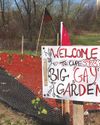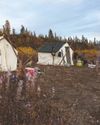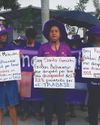Palestinian workers in illegal Israeli settlements are calling for BDS – even though it may mean they lose their jobs

Yousef,* Samih,* and Hasan* are exhausted. Their eyes are heavy and Samih is slumped in his chair. It’s after 10 p.m. and the 14-, 15-, and 16-year-old need to get up for work in less than six hours.
“We have no choice,” explains Yousef. “If we don’t go to work they will kick us out. It’s peak season.”
The three Palestinian teenagers work together in the fields of a capsicum and chili pepper farm, in the illegal Israeli settlement of Tomer, West Bank. The West Bank, which is part of Palestine, has been militarily occupied since Israel invaded in 1967.
Every day the boys start work at 5:30 a.m., harvesting peppers to be packed and sold across Israel, the West Bank, and elsewhere in the world. Most of their fellow workers are teenagers like them, some child labourers as young as 13 years old.
Despite the hard, physical work – and their young age – they say they are not allowed any breaks during the day – not even to go to the toilet or get a drink. “We go to the toilet before we go to work. If they catch us going in the farm they will punish us,” says Yousef.
They are also exposed to the pesticides used in the fields. “They have a machine to spray the pesticides,” Hasan tells us. “The guys who spray it wear a mask, but they do it while the workers are harvesting the peppers, and we don’t have a mask or gloves.”
“We breathe in the chemicals. It’s toxic. They use plastic over the farm, so it’s enclosed. We feel it in our eyes,” says Yousef.
They are not provided with drinking water, so they have to drink the water from the same hose line that is used on the capsicum plants. They are worried that this may also be polluted with chemicals.
This story is from the November/December 2018 edition of Briarpatch.
Start your 7-day Magzter GOLD free trial to access thousands of curated premium stories, and 9,000+ magazines and newspapers.
Already a subscriber ? Sign In
This story is from the November/December 2018 edition of Briarpatch.
Start your 7-day Magzter GOLD free trial to access thousands of curated premium stories, and 9,000+ magazines and newspapers.
Already a subscriber? Sign In

PLATFORMS FOR PEOPLE, NOT PROFIT
Digital platforms boast that they’ve “democratized” cultural production. But what would truly democratic platforms look like in Canada?

ORGANIZING THROUGH LOSS IN THE HEART OF OIL COUNTRY
The story of climate justice organizing in Alberta, at the heart of the tarsands, is the story of a group of young activists learning what it means to lose, and keep on fighting

GROWING THE LABOUR MOVEMENT
How unions are using community gardens to engage members, nourish communities, and help strikers weather the picket line

A NEW ERA FOR OLD CROW
In the Yukon’s northernmost community, the Vuntut Gwitchin First Nation is reckoning with how to preserve their land and culture, amid a warming climate and an influx of tourists

“At Least Hookers Get Wages”
The risky business of sex work in the gig economy

The Literal – And Literary – Futures We Build
Briarpatch editor Saima Desai talks to two judges of our Writing in the Margins contest about Idle No More and MMIWG, ethical kinship, writing queer sex, and their forthcoming work.

The Cost Of A T-Shirt
In Honduras, women maquila workers are fighting back against the multinational garment companies that they say are endangering their health and safety.

Milking Prison Labour
Canada’s prison farms are being reopened. But when prisoners will be paid pennies a day, and the fruits of their labour will likely be exported for profit, there’s little to celebrate.

Bringing Back The Beat
In mainstream media, labour journalism has been replaced by financial reporting and business sections. But journalism students are raising the labour beat from the grave.

There's No Journalism On A Dead Planet
Corporate media owners are killing local newspapers – which is making it impossible for everyday people to understand the on-the-ground impacts of the climate crisis